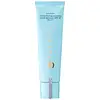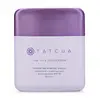What's inside
What's inside
 Key Ingredients
Key Ingredients

 Benefits
Benefits

 Concerns
Concerns

 Ingredients Side-by-side
Ingredients Side-by-side

Zinc Oxide 15%
Cosmetic ColorantEthylhexyl Salicylate 5%
UV AbsorberWater
Skin ConditioningIsododecane
EmollientCyclopentasiloxane
EmollientPropanediol
SolventHdi/Trimethylol Hexyllactone Crosspolymer
Glycerin
HumectantDimethicone
EmollientOctyldodecyl Neopentanoate
EmollientBehenyl Alcohol
EmollientDimethicone/Vinyl Dimethicone Crosspolymer
Skin ConditioningRosa Multiflora Fruit Extract
MaskingEriobotrya Japonica Leaf Extract
Skin ConditioningStearyl Glycyrrhetinate
Skin ConditioningGlycyrrhiza Inflata Root Extract
Skin ConditioningCamellia Sinensis Leaf Extract
AntimicrobialPistacia Lentiscus Gum
MaskingSericin
Skin ConditioningAlgae Extract
EmollientLecithin
EmollientInositol
HumectantPolyhydroxystearic Acid
EmulsifyingSorbitan Tristearate
EmulsifyingSodium Dilauramidoglutamide Lysine
HumectantSilica
AbrasivePotassium Sorbate
PreservativeBeheneth-20
EmulsifyingSodium Acrylate/Acryloyldimethyltaurate/Dimethylacrylamide Crosspolymer
Emulsion StabilisingPolymethylsilsesquioxane
Methicone
EmollientTrimethylsiloxysilicate
EmollientDimethiconol
EmollientDisodium EDTA
Parfum
MaskingEthylhexylglycerin
Skin ConditioningAlcohol
AntimicrobialPhenoxyethanol
PreservativeCI 77491
Cosmetic ColorantCI 77891
Cosmetic ColorantMica
Cosmetic ColorantZinc Oxide 15%, Ethylhexyl Salicylate 5%, Water, Isododecane, Cyclopentasiloxane, Propanediol, Hdi/Trimethylol Hexyllactone Crosspolymer, Glycerin, Dimethicone, Octyldodecyl Neopentanoate, Behenyl Alcohol, Dimethicone/Vinyl Dimethicone Crosspolymer, Rosa Multiflora Fruit Extract, Eriobotrya Japonica Leaf Extract, Stearyl Glycyrrhetinate, Glycyrrhiza Inflata Root Extract, Camellia Sinensis Leaf Extract, Pistacia Lentiscus Gum, Sericin, Algae Extract, Lecithin, Inositol, Polyhydroxystearic Acid, Sorbitan Tristearate, Sodium Dilauramidoglutamide Lysine, Silica, Potassium Sorbate, Beheneth-20, Sodium Acrylate/Acryloyldimethyltaurate/Dimethylacrylamide Crosspolymer, Polymethylsilsesquioxane, Methicone, Trimethylsiloxysilicate, Dimethiconol, Disodium EDTA, Parfum, Ethylhexylglycerin, Alcohol, Phenoxyethanol, CI 77491, CI 77891, Mica
Zinc Oxide 10%
Cosmetic ColorantWater
Skin ConditioningC12-15 Alkyl Benzoate
AntimicrobialCaprylic/Capric Triglyceride
MaskingLauryl PEG-8 Dimethicone
Dimethicone
EmollientIsododecane
EmollientTridecyl Salicylate
Skin ConditioningHdi/Trimethylol Hexyllactone Crosspolymer
Propanediol
SolventCaprylyl Methicone
Skin ConditioningPolymethylsilsesquioxane
Niacinamide
SmoothingSaccharomyces/Rice Ferment Filtrate
Skin ConditioningSilica
AbrasiveSqualane
EmollientCamellia Sinensis Leaf Extract
AntimicrobialCladosiphon Okamuranus Extract
Skin ConditioningHydrolyzed Silk
HumectantBisabolol
MaskingAllantoin
Skin ConditioningTocopherol
AntioxidantTheobroma Cacao Seed Extract
AntioxidantArctium Lappa Root Extract
Skin ConditioningKappaphycus Alvarezii Extract
Skin ConditioningSodium Hyaluronate
HumectantLecithin
EmollientCaesalpinia Spinosa Fruit Extract
Skin ProtectingLactobacillus
Skin ConditioningMaltodextrin
AbsorbentCaprylyl Glycol
EmollientDimethicone Crosspolymer
Emulsion StabilisingHydrogenated Lecithin
EmulsifyingTetrasodium Glutamate Diacetate
PEG-10
HumectantPolyglyceryl-2 Dipolyhydroxystearate
Skin ConditioningPropylene Glycol
HumectantLauryl PEG-10 Tris(Trimethylsiloxy)Silylethyl Dimethicone
EmulsifyingPolyglyceryl-4 Diisostearate/Polyhydroxystearate/Sebacate
EmulsifyingButylene Glycol
HumectantPhosphoric Acid
BufferingSodium Hydroxide
BufferingSodium Chloride
MaskingHexylene Glycol
EmulsifyingEthylhexylglycerin
Skin ConditioningPhenoxyethanol
PreservativeIron Oxides
Zinc Oxide 10%, Water, C12-15 Alkyl Benzoate, Caprylic/Capric Triglyceride, Lauryl PEG-8 Dimethicone, Dimethicone, Isododecane, Tridecyl Salicylate, Hdi/Trimethylol Hexyllactone Crosspolymer, Propanediol, Caprylyl Methicone, Polymethylsilsesquioxane, Niacinamide, Saccharomyces/Rice Ferment Filtrate, Silica, Squalane, Camellia Sinensis Leaf Extract, Cladosiphon Okamuranus Extract, Hydrolyzed Silk, Bisabolol, Allantoin, Tocopherol, Theobroma Cacao Seed Extract, Arctium Lappa Root Extract, Kappaphycus Alvarezii Extract, Sodium Hyaluronate, Lecithin, Caesalpinia Spinosa Fruit Extract, Lactobacillus, Maltodextrin, Caprylyl Glycol, Dimethicone Crosspolymer, Hydrogenated Lecithin, Tetrasodium Glutamate Diacetate, PEG-10, Polyglyceryl-2 Dipolyhydroxystearate, Propylene Glycol, Lauryl PEG-10 Tris(Trimethylsiloxy)Silylethyl Dimethicone, Polyglyceryl-4 Diisostearate/Polyhydroxystearate/Sebacate, Butylene Glycol, Phosphoric Acid, Sodium Hydroxide, Sodium Chloride, Hexylene Glycol, Ethylhexylglycerin, Phenoxyethanol, Iron Oxides
 Reviews
Reviews

Ingredients Explained
These ingredients are found in both products.
Ingredients higher up in an ingredient list are typically present in a larger amount.
Camellia Sinensis Leaf Extract is derived from the leaves of the tea plant. Black tea, green tea, and oolong tea are all harvested from this plant.
This ingredient has many skin benefits:
This ingredient contains polyphenols, a strong antioxidant. Antioxidants help fight off molecules that damage skin cells.
On top of that, the antioxidants in green tea neutralize free-radicals from the sun. This gives the skin some extra UV protection, but should not replace sunscreen.
Many components of tea have anti-inflammatory properties.
Polyphenols and L-theanine help soothe the skin and reduce irritation. The caffeine in Camellia Sinensis Leaf Extract helps calm inflamed blood vessels.
Other compounds found in tea include: Vitamin Bs, linoleic acid, magnesium, calcium, iron, and zinc.
Research has shown both drinking Camellia Sinensis Leaf Tea and applying it to the skin can help boost skin elasticity and hydration. Studies also show using tea extract may reduce sebum, or oil, production.
Learn more about Camellia Sinensis Leaf ExtractDimethicone is a type of synthetic silicone created from natural materials such as quartz.
What it does:
Dimethicone comes in different viscosities:
Depending on the viscosity, dimethicone has different properties.
Ingredients lists don't always show which type is used, so we recommend reaching out to the brand if you have questions about the viscosity.
This ingredient is unlikely to cause irritation because it does not get absorbed into skin. However, people with silicone allergies should be careful about using this ingredient.
Note: Dimethicone may contribute to pilling. This is because it is not oil or water soluble, so pilling may occur when layered with products. When mixed with heavy oils in a formula, the outcome is also quite greasy.
Learn more about DimethiconeEthylhexylglycerin (we can't pronounce this either) is commonly used as a preservative and skin softener. It is derived from glyceryl.
You might see Ethylhexylglycerin often paired with other preservatives such as phenoxyethanol. Ethylhexylglycerin has been found to increase the effectiveness of these other preservatives.
This ingredient is a powder used to improve texture, slip, and give products a silky texture.
Isododecane is a fragrance, emollient, and solvent.
As an emollient, it helps your skin stay soft and hydrated. Emollients help trap moisture into your skin.
Isododecane's role as a solvent makes it a great texture enhancer. It spreads smoothly on skin and does not leave a sticky feeling behind. Isododecane also helps prevent color transfer in makeup products.
Isododecane is not absorbed into skin.
Learn more about IsododecaneLecithin is a term for a group of substances found in the cell membranes of plants, animals, and humans. They are made up of mixture of phospholipids.
This ingredient has emollient and emulsifying properties.
As an emollient, lecithen helps soften the skin and creates a barrier to keep moisture in.
As an emulsifier, it also helps prevent water and oil ingredients from separating. Lecithin can also help ingredients be better absorbed by the skin.
This is because the phospholipids in lecithin produce liposomes. Liposomes help other ingredients get through the skin barrier.
Depending on the source of this ingredient, lecithin may not be fungal acne safe. This is because some sources of lecithin come from soybean oil, which may feed the malassezia yeast that feeds fungal acne.
We recommend reaching out to the brand you are purchasing from to inquire about the source of their lecithin.
Some other names for this ingredient include soy lecithin and deoiled soy lecithin.
Learn more about LecithinPhenoxyethanol is a preservative that has germicide, antimicrobial, and aromatic properties. Studies show that phenoxyethanol can prevent microbial growth. By itself, it has a scent that is similar to that of a rose.
It's often used in formulations along with Caprylyl Glycol to preserve the shelf life of products.
Polymethylsilsesquioxane is a silicone used as a film forming agent.
When applied to the skin, this ingredient creates an invisible film on the surface. This film still allows oxygen to pass through, but prevents moisture from escaping. This can help condition and hydrate the skin. It also leaves a silky feel when applied.
Polymethylsilsesquioxane has not been shown to clog pores. It has been deemed safe to use up to 55%, but most cosmetics use much less.
If you have concerns about using this ingredient, we recommend speaking with a professional.
Learn more about PolymethylsilsesquioxanePropanediol is an all-star ingredient. It softens, hydrates, and smooths the skin.
It’s often used to:
Propanediol is not likely to cause sensitivity and considered safe to use. It is derived from corn or petroleum with a clear color and no scent.
Learn more about PropanediolSilica, also known as silicon dioxide, is a naturally occurring mineral. It is used as a fine, spherical, and porous powder in cosmetics.
Though it has exfoliant properties, the function of silica varies depending on the product.
The unique structure of silica enhances the spreadability and adds smoothness, making it a great texture enhancer.
It is also used as an active carrier, emulsifier, and mattifier due to its ability to absorb excess oil.
In some products, tiny microneedles called spicules are made from silica or hydrolyzed sponge. When you rub them in, they lightly polish away dead skin layers and enhance the penetration of active ingredients.
Learn more about SilicaWater. It's the most common cosmetic ingredient of all. You'll usually see it at the top of ingredient lists, meaning that it makes up the largest part of the product.
So why is it so popular? Water most often acts as a solvent - this means that it helps dissolve other ingredients into the formulation.
You'll also recognize water as that liquid we all need to stay alive. If you see this, drink a glass of water. Stay hydrated!
Learn more about WaterZinc Oxide is a mineral broad-spectrum UV filter; it is the broadest UVA and UVB reflector approved by the FDA. It also has skin protectant and skin soothing properties.
Zinc oxide is one of the most effective broad-spectrum UV filters. It protects against UVB, UVAII, and UVAI. In comparison to its counterpart titanium dioxide, zinc oxide provides uniform and extended UVA protection.
Another great benefit? This ingredient is highly photostable so it won't degrade easily under sunlight.
A common myth is that mineral UV filters are widely believed to primarily reflect UV light.
However, modern research shows titanium dioxide absorbs UV radiation like chemical filters (~95% absorption & 5% reflection).
Zinc oxide has great skin soothing properties so you'll likely find this in sunscreens formulated for sensitive skin or babies/children. It is unlikely to cause "eye sting" like other sunscreen ingredients.
Regulatory agencies consider zinc oxide to be non-toxic and safe. It has also been shown to not penetrate the skin.
Unfortunately, this ingredient does leave a visible white cast. This is why mineral sunscreens are often less cosmetically elegant than chemical or hybrid ones.
In cosmetics, zinc oxide can be found in both non-nano and nano-sized forms. The nano version is used to reduce white cast and improve the texture of sunscreen formulas.
There are ongoing concerns surrounding nano-zinc oxide's impact on marine ecosystems and whether it can be absorbed into skin.
Regarding marine ecosystems and coral reefs, there is no conclusive evidence that any form of zinc oxide (or any other sunscreen ingredients) will cause harm. The science is still developing but many consumers are keeping a close eye on this issue.
Please note, many destinations have reef-safety sunscreen rules. For instance, the U.S. Virgin Islands advises all visitors to use non-nano mineral sunscreens.
There has also been some stir about whether micronized or nano zinc oxide has potential photoxicity and absorption through the skin/lungs.
An in-vitro (done in a test tube or petri dish) study demonstrated micronized zinc oxide to have potential phototoxicity. There's no need to fret; the EU Commission's Scientific Committee on Consumer Safety has stated, "The relevance of these findings needs to be clarified by appropriate investigations in vivo." Or in other words, further studies done on living organisms are needed to prove this.
Current research shows zinc oxide nanoparticles do not penetrate intact or sunburned skin. They either remain on the surface or in the outermost layer of dead skin (stratum corneum).
Zinc oxide is one of only two classified mineral UV filters with titanium dioxide being the other one.
Fun fact: Zinc has been used throughout history as an ingredient in paint and medicine. An Indian text from 500BC is believed to list zinc oxide as a salve for open wound. The Ancient Greek physician Dioscorides has also mentioned the use of zinc as an ointment in 1AD.
Learn more about Zinc Oxide